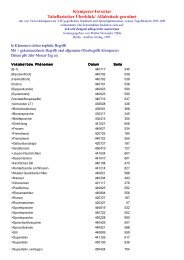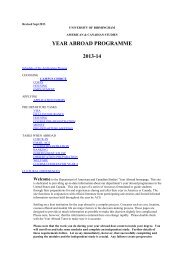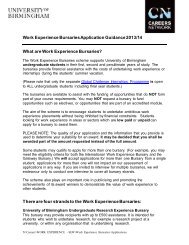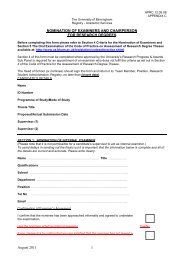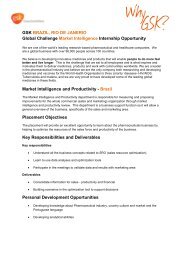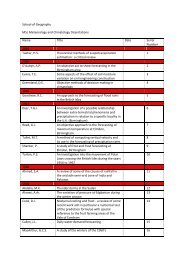APRC 120202 appendix 2 (PDF - 958KB) - University of Birmingham
APRC 120202 appendix 2 (PDF - 958KB) - University of Birmingham
APRC 120202 appendix 2 (PDF - 958KB) - University of Birmingham
- No tags were found...
You also want an ePaper? Increase the reach of your titles
YUMPU automatically turns print PDFs into web optimized ePapers that Google loves.
opportunity may be limited by numbers, and Schools may wish to restrict participation in anoptional placement year to students who have achieved a certain mark in specific modules,or who have achieved a specified overall year mark. Any such restrictions will be specified inthe programme requirements and agreed by Senate or under delegated authority.3.3 Academic Requirements.1 Schools should articulate within the programme/module specification:• The structure <strong>of</strong> the placement and how the placement contributes to the overall programme<strong>of</strong> study;• Pr<strong>of</strong>essional, Statutory and Regulatory Body requirements, as appropriate;• How the placement provider will ensure that opportunity is provided to the student to achievethe intended learning outcomes (through a mechanism such as a Learning Agreement);• Assessment <strong>of</strong> the placement and the consequences <strong>of</strong> student failure.Contribution to Programme.2 Regardless <strong>of</strong> the form placement learning takes, Schools need to consider the contributionthat placement learning makes to the overall aims <strong>of</strong> the programme and programmelearning outcomes when designing, approving, monitoring and reviewing the programme andwhen designing and implementing the assessment strategy.Learning Outcomes.3 Schools should ensure that their programme specifications and student guidance notesmake clear what the expectations are <strong>of</strong> the placement learning activity. Programmespecifications must be clear about the outcome for students if the placement year is failed..4 Placement learning opportunities may provide students with many <strong>of</strong> the outcomes identifiedin the Framework for Higher Education Qualifications(http://www.qaa.ac.uk/Publications/InformationAndGuidance/Documents/FHEQ08.pdf). Forexample, the descriptor for an Honours (H) level degree includes the following statements:(a) Students should demonstrate the ability to manage their own learning(b) Students should be able to communicate information, ideas, problems and solutions toboth specialist and non-specialist audiences(c) Students should have qualities and transferable skills necessary for employmentrequiring the exercise <strong>of</strong> initiative and personal responsibility, decision-making incomplex and unpredictable contexts and the learning ability needed to undertakeappropriate further trainingAssessment, Progress and Monitoring.5 The assessment <strong>of</strong> placement learning should be subject to the usual School procedures forinternal moderation and external examining, and standards applied to assessment <strong>of</strong>placement learning must be consistent with QAA Subject Benchmark Statements and otherreference points, such as the Framework for Higher Education Qualifications. If theplacement learning forms a substantial part <strong>of</strong> the module credit, the learning outcomesshould be identified and the assessment test whether these agreed outcomes have beenachieved.




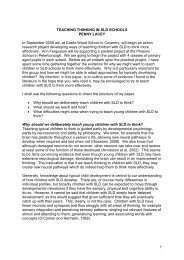
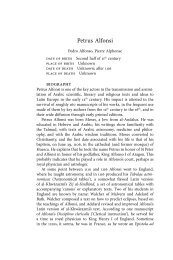
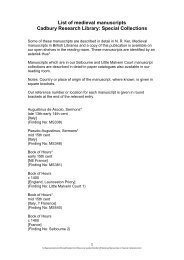
![Benyamin Asadipour-Farsani [EngD Conference abstract]](https://img.yumpu.com/51622940/1/184x260/benyamin-asadipour-farsani-engd-conference-abstract.jpg?quality=85)

